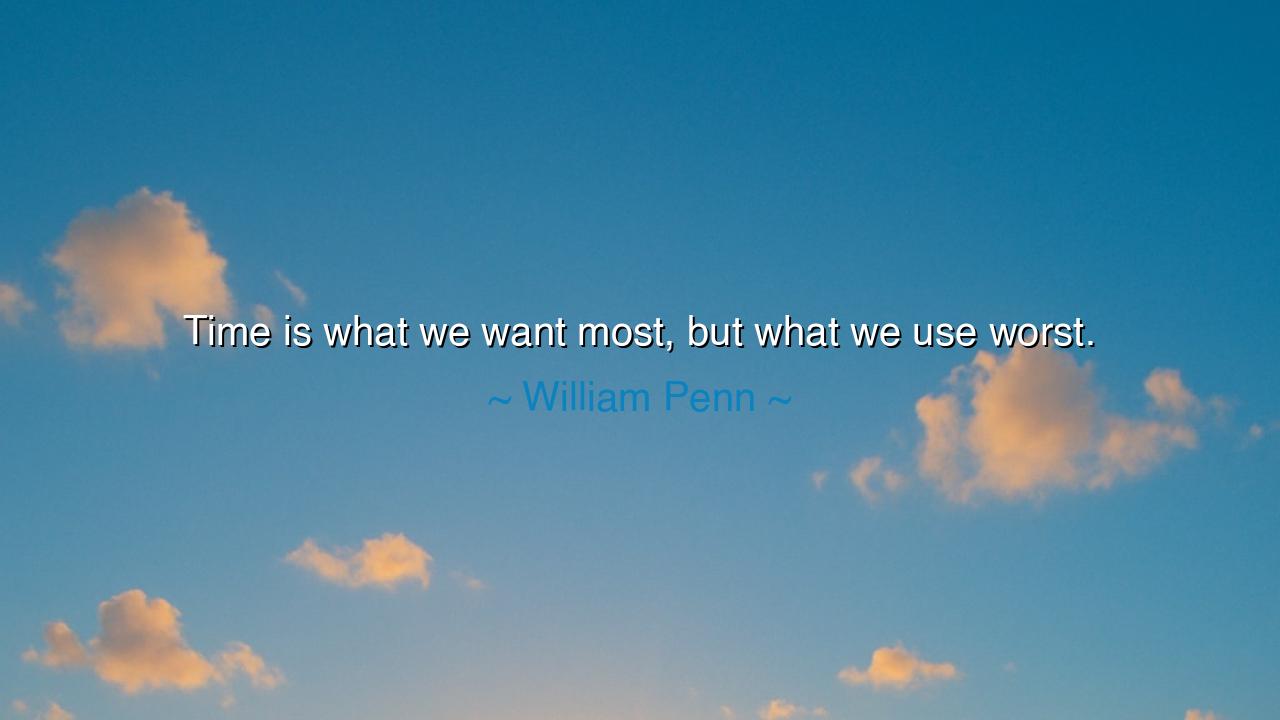
Time is what we want most, but what we use worst.






William Penn, the Quaker visionary and founder of Pennsylvania, once said with piercing clarity: “Time is what we want most, but what we use worst.” These words strike the soul like a bell in a still hall, for they remind us of the paradox of human existence: no gift is more coveted than time, and yet no treasure is so often squandered. Men pray for longer days, longer lives, yet they let the hours slip through their fingers like sand, wasted on trifles and vanities.
The origin of this saying lies in Penn’s life as both a religious thinker and a statesman. A man who valued reflection, simplicity, and justice, he observed how people cry out for more time, but fail to honor what they already possess. His words were not mere condemnation, but a warning and a plea: awaken to the brevity of life, for once spent, time can never be reclaimed. In this sense, Penn echoed the wisdom of the ancients, who saw the hours as golden coins, entrusted to us by Providence, to be spent wisely.
History provides us lessons that reveal the truth of Penn’s statement. Consider the life of Napoleon Bonaparte, who conquered nations but lost his empire not only to his enemies, but to the poor use of time in his campaigns. Hesitation in Russia, delay at Waterloo—each moment wasted turned the tide of history against him. Though he possessed power beyond most men, his mismanagement of time brought his downfall. Truly, even emperors cannot misuse the hours without consequence.
In contrast, look at the life of Benjamin Franklin, another great son of Pennsylvania. Franklin, though never rich in his youth, became a man of wisdom, influence, and invention because he treated every minute as sacred. His adages—“Dost thou love life? Then do not squander time, for that is the stuff life is made of”—echo Penn’s truth. By honoring his hours, Franklin transformed them into legacies that outlast centuries. Where others wasted, he invested.
The deeper meaning of Penn’s words is that time is not simply a measure of hours, but the very essence of life. To waste it is to waste oneself. Many believe they will begin to live tomorrow, or next year, or in some far-off age when conditions are perfect. Yet tomorrow is uncertain, and the minutes lost today are gone forever. The tragedy of man is that he begs for what he daily throws away.
The lesson is urgent and eternal: value your time as you would value life itself. For it is life. Do not long for more years if you cannot honor the days already given. Organize your hours not around distraction, but around purpose. Let your mornings be spent in learning, your afternoons in labor, your evenings in reflection and fellowship. Treat each day as a field—sow it well, and it will yield harvest; neglect it, and it will yield only regret.
Practically, this means living with intentionality and discipline. Guard against idle pursuits that consume your strength but offer no fruit. Limit what drains you and embrace what builds you. Dedicate time to love, to knowledge, to service, to creation. Measure your success not in years survived, but in hours well used.
So remember, children of tomorrow: time is what we want most, but what we use worst. Do not be among the careless who beg for length of days while squandering the hours. Instead, live so that each minute shines with purpose. For the wise do not count their years—they make their years count.






AAdministratorAdministrator
Welcome, honored guests. Please leave a comment, we will respond soon